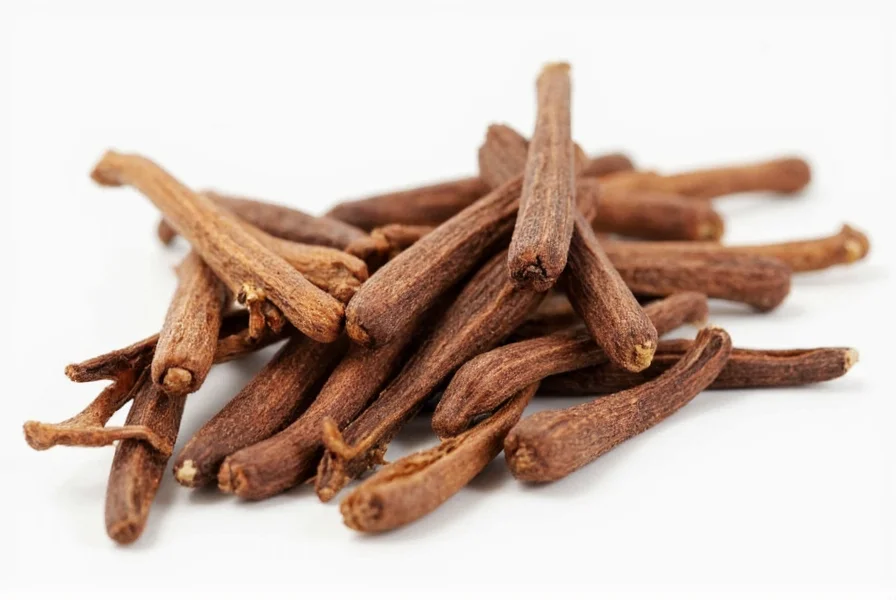When you bite into a whole clove, an immediate warming sensation spreads across your palate, followed by a sweet-spicy flavor with distinct notes of pepper, citrus, and subtle bitterness. This unique sensory experience makes cloves one of the most recognizable spices in global cuisine. The intensity can be overwhelming when used excessively, which is why chefs typically use cloves sparingly in recipes.
The Science Behind Clove Flavor
Eugenol, the primary chemical compound in cloves (constituting 70-90% of clove essential oil), is responsible for both the characteristic flavor and the mild numbing effect. This phenolic compound interacts with pain receptors in your mouth, creating that distinctive tingling sensation that distinguishes cloves from other spices. Secondary compounds like caryophyllene contribute earthy, woody notes, while minor components add subtle citrus and floral hints to the overall profile.
| Flavor Component | Percentage in Clove Oil | Sensory Impact |
|---|---|---|
| Eugenol | 70-90% | Warm, spicy, numbing sensation |
| Beta-Caryophyllene | 5-15% | Woody, earthy base notes |
| Eugenyl Acetate | 1-10% | Floral, sweet undertones |
| Limonene | 1-5% | Citrus notes |
Whole vs. Ground Cloves: Taste Differences
Understanding what whole cloves taste like compared to ground varieties is crucial for culinary applications. Whole cloves maintain their flavor compounds longer and deliver a more controlled release of flavor when cooked. When bitten directly, whole cloves produce a more intense, focused numbing sensation that gradually spreads. Ground cloves, while more convenient, lose their volatile compounds faster and create a more immediate but less complex flavor experience with less pronounced numbing effect.

Culinary Applications Based on Flavor Profile
The distinctive taste of cloves makes them invaluable in specific culinary contexts. In sweet applications like pumpkin pie spice or mulled wine, cloves contribute warmth without overwhelming sweetness. In savory dishes such as Indian biryanis or Chinese five-spice powder, they provide depth and complexity that balances richer ingredients. The key to using cloves effectively is understanding their potency—typically just 1-2 whole cloves suffice for a dish serving four people.
When cooking with cloves, remember that heat transforms their flavor. Simmering whole cloves in liquids extracts their sweet notes while mellowing the bitterness. Dry roasting enhances their warm, peppery characteristics. This versatility explains why cloves appear in diverse global cuisines from Moroccan tagines to Indonesian kretek cigarettes.
Flavor Pairings and Complementary Ingredients
Cloves pair exceptionally well with ingredients that complement their complex profile. Cinnamon and nutmeg enhance their warmth while balancing the intensity. Citrus elements like orange zest counteract the bitterness and highlight clove's subtle citrus notes. For savory applications, cloves work beautifully with rich meats like pork and game, where their astringency cuts through fattiness. In baking, they complement apples, pears, and stone fruits particularly well.
A common question among home cooks is how strong is the taste of cloves compared to other spices. Cloves rank among the most potent spices—just one clove contains enough flavor compounds to season an entire cup of liquid. This explains why recipes typically call for whole cloves that can be removed before serving, preventing an overpowering experience.
Common Misconceptions About Clove Flavor
Many people mistakenly believe cloves taste purely bitter or medicinal. While they do have bitter elements, the complete flavor profile includes significant sweet and warm notes that create balance. Another misconception is that cloves taste the same whether used whole or ground—when in reality, the physical form significantly impacts flavor release and intensity. Some also confuse clove's numbing effect with actual heat like chili peppers, when it's actually a different sensory mechanism entirely.
Safety Considerations and Sensory Effects
The numbing quality of cloves makes them useful for temporary toothache relief, but this same property requires careful usage in cooking. Consuming too many whole cloves can cause temporary numbness that affects your ability to taste other foods. The FDA considers cloves generally safe as a food ingredient, but recommends moderation due to their potency. When using cloves in beverages like chai or mulled wine, remember that the flavor continues to intensify as the liquid steeps.

How Clove Flavor Changes with Processing
The taste of cloves evolves significantly through different processing methods. Fresh clove buds have a more floral, delicate flavor compared to dried cloves, which develop deeper, more complex notes. Sun-dried cloves develop stronger bitter elements, while oven-dried versions retain more of their sweet citrus characteristics. The curing process concentrates eugenol content, which explains why commercial cloves taste more intense than freshly picked ones.
For those wondering does clove taste sweet or bitter, the answer is both—along with multiple other dimensions. The initial impression is often sweet and warming, followed by peppery notes, with a subtle bitter finish that provides complexity. This layered flavor profile is what makes cloves irreplaceable in certain recipes where substitute spices fall short.










 浙公网安备
33010002000092号
浙公网安备
33010002000092号 浙B2-20120091-4
浙B2-20120091-4